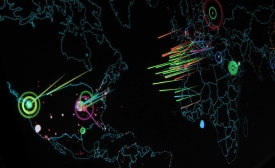media
Russia’s combination of traditional public diplomacy and messaging through media organizations like Russia Today (RT) and Sputnik with disinformation and internet trolls is also important. Moreover, in nearby regions, Russia’s domestic media can serve as a powerful instrument in socializing foreign compatriots into a wider Russian cultural world.

Forget proxy metrics and studying a single Twitter list—this is what Jihadist information dissemination really looks like.

The CNN effect was touted through the 1990s, but today's media-conflict relationship is a bit more complex.
Initially screened once a week, the show quickly captivated mainstream Australian viewers as well as Chinese-speaking migrants, so that now, due to popular demand, it is screened three times a week. SBS’s online promotion for the show says, ‘With a viewing audience of up to 50 million per episode, this popular Chinese dating show is a cultural phenomenon’.
The European Union is facing increasing pressure to speak out against the erosion of media freedom in Turkey following the forced take-over of the country’s largest-circulation newspaper, but few expect it to take a bold stance toward Ankara while trying to assure its help in dealing with the migration crisis.
The fun and joy that Xinhua is searching for reflects a quandary facing China’s leadership: As Xi navigates a difficult phase of his administration, his messaging machine — for decades one of the Communist Party’s most crucial levers of power — has been struggling to make itself heard.
The BBC has confirmed its intention to create a radio service for North Korea, although, despite a recent report, a start date for this service has not been set. North Korea’s recent test of what it described as a hydrogen bomb, and its launch of a long-range missile, have instilled urgency to the BBC’s plans.







